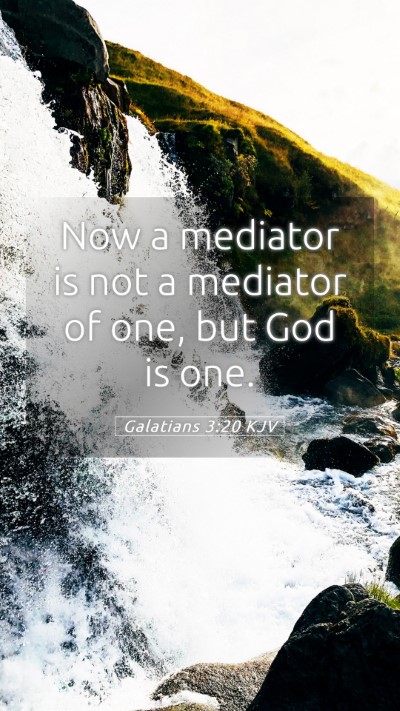Understanding Galatians 3:20
Galatians 3:20 states: "Now a mediator is not a mediator of one, but God is one." This verse highlights the role of a mediator in communication and relationship between two parties, particularly in the context of God's covenant with humanity.
Bible Verse Meaning and Interpretation
This verse is fundamental for understanding the contrast between the Mosaic Law and the promise given to Abraham. Here we explore the insights from various public domain commentaries, including those of Matthew Henry, Albert Barnes, and Adam Clarke.
Insights from Commentaries
-
Matthew Henry's Commentary:
Matthew Henry emphasizes that the role of a mediator indicates that there are two parties in a covenant. The Apostle Paul mentions that while the Law was given through mediators (Moses), the promise was singularly directed and does not require a mediator. This illustrates the unique role of God in delivering the promise, reaffirming His oneness.
-
Albert Barnes' Commentary:
Barnes points out that Paul uses this point to show that the covenant of grace and the covenant of the Law are fundamentally different. A mediator implies multiple sides; however, God is one and does not share His authority. The Law brought about a temporary arrangement for Israel, while the promise made to Abraham was unconditional and stands firm without additional mediation.
-
Adam Clarke's Commentary:
Clarke elaborates on the nature of God's singularity. The term 'one' emphasizes the unity of God and presents a theological assertion that God's way of salvation is straightforward and direct. The implication that God does not need a mediator for His promises asserts His sovereignty and sufficiency in fulfilling His word.
Contextual Background
To fully grasp the importance of Galatians 3:20, it is essential to consider the larger discourse in which it is found. The Apostle Paul writes to a church grappling with the practical implications of faith versus the Law. By addressing the need for a mediator, Paul clarifies that the relationship established through faith in Christ is direct and profound, differing from the historical context where Moses served as an intermediary.
Applications to Daily Life
Understanding this verse assists in recognizing that believers today can approach God directly without the need for intermediaries. This reflects a significant aspect of Christian doctrine—access to God through faith in Jesus Christ, who fulfills the promises laid out in Scripture.
Related Biblical Cross References
- Exodus 20:19: highlights the people’s request for mediation following the giving of the Law.
- 1 Timothy 2:5: states, "For there is one God and one mediator between God and men, the man Christ Jesus."
- Hebrews 8:6: points to the superior ministry of Jesus as the mediator of a better covenant.
- Galatians 2:20: emphasizes the believer's faith in the Son of God who loved us and gave Himself for us.
Final Thoughts on Galatians 3:20
This verse encapsulates the essence of a singular divine relationship through faith without the need for any intermediary. As you reflect on Galatians 3:20, consider how this truth of direct access to God shapes your faith and leads you to deeper insights in your Bible study. For many, comprehending such verses requires in-depth analysis and careful consideration, making this study relevant for Bible study groups and online Bible study contexts.


